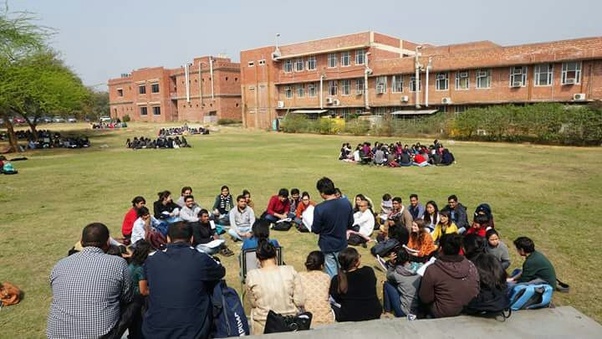I love the vocation of teaching. As a teacher, I celebrated its wonder and possibilities. I taught at a research university for more than thirty- one years. And now, I have no hesitation in saying that this act of teaching transformed me: from a mere subject- specialist to a spirited wanderer. It also enabled me to interrogate and eventually transcend the dichotomy of research vs. teaching. Good research is impossible without engaged pedagogy and meaningful teaching/learning; and life-affirming teaching is not a bureaucratically defined official task: ‘covering’ the syllabus, conducting examinations, and grading your students; instead, teaching is a nuanced art that needs to be cultivated every morning as you come to the class, and relate to your students. A teacher is not a tape recorder—repeating what the ‘texts’ have said; instead, a teacher ought to be a thinker, wanderer, creator. In a way, teaching is everyday research—continually exploring and expanding one’s mental horizon and psychic/cultural landscape, rethinking pedagogy, and ways of building a bridge between the ‘self’ and the ‘world’. It is a delicate task of transforming a book into a truly lived experience.
Art of Compassionate Listening
It is in this context that I wish to reflect on three fundamental lessons that I learned as a teacher. To begin with, I must stress on the art of compassionate listening. This is like acknowledging that every student has a story to tell; every student is a possibility; and no learning/unlearning is possible without creating a non-judgmental environment that encourages every student—‘intelligent’ or ‘mediocre’, ‘privileged’ or ‘marginalized’, ‘progressive’ or ‘conservative’—to feel free and relaxed, articulate her voice, and take an active part in the transaction of ideas and knowledge. Quite often, a teacher—and that too at a university like ours where I taught—could silence her students because of the burden of the ‘image’ she carries with her—publications, research projects, fame and aura. The practice of this power is very subtle. A student might feel hesitant to articulate her voice and experience because of the fear that speaking something in front of the ‘all-knowing’ teacher might look stupid or ridiculous. Moreover, even the teacher might not be very interested in learning from students. Hence, it is not impossible to see your classrooms where you see a professor’s ‘scholarly’ monologue amid the passivity and silence of students. But then, when as a teacher, you converse with your students, listen to them with great care, and as co-travellers, begin to learn new ideas, concepts and theories, a miracle happens. The classroom becomes alive and vibrant; a culture of debate and dialogue takes place; a ‘Marxist’ listens to a ‘Gandhan’; a metropolitan ‘feminist’ who has read only Simone de Beauvoir and Judith Butler learns to converse with a Bhojpuri-speaking young girl from Bihar who seeks to overcome the chains of patriarchy and caste hierarchy, and make her own choices.
Yes, in these thirty- one years, I have learned the worth of this art of compassionate listening. I have learned and unlearned. I have evolved as a human being. Possibly, I have become more open, receptive and dialogic. And I have realized the futility of power—the power that enables the teacher to silence her students, and transform them as just passive receivers of the ‘texts’ she regards as ‘sacred’. Instead, I have felt the power of listening and dialogue; and I have realized that your student understands Marx and Foucault better when you assure them that they too matter, and they must scrutinize these thinkers through their eyes, struggles and experiences. Yes, with this art of listening, I have begun to value the worth of experience in the classroom. This is like perpetually questioning the coldness of the academia—the fetish of abstraction.
Art of Communication
Second, I have realized the significance of the art of communication. Neither your attractive CV, nor your position as a Dean/Chairperson matters as you teach. What matters is just your living presence: your enthusiasm, your joy and your ability to share your ideas with young minds in a way that they are filled with the abundance of creative life-energy, and invited to the domain of ideas. Hence, meaningful teaching is different from the act of writing papers in professional journals. As a scholar, you write research papers to communicate primarily with your peers and colleagues. However, the same language, the same style, the same jargon might not be very beneficial when you teach a young student who has just begun her academic life. As a teacher, we ought to be free from the narcissism of the ‘intellect’; we ought to see ourselves as communicators who can bring the beauty of metaphor, poetry and lived experiences in the classroom, and encourage students to see, feel, experience and understand the nuanced meanings of concepts and theories deeply and passionately. Using jargon, repeatedly taking refuge in the bookish language, and even reducing sociology or philosophy into a kind of differential calculus: these are by no means the virtues of a teacher. The joy of sharing ideas, or the joy of seeing the illuminating light in the eyes of a young learner: this is what makes the culture of learning a celebration. And this is no less challenging than the act of writing research papers. You cannot hierarchize: I am ‘serious’ when I write research papers; and I am ‘casual’ when I teach! And in these thirty- one years, I have tried time and again to master this art of communication. No wonder, even though I taught different branches of sociology, never did I forget to invite Walt Whitman and Rabindranath Tagore, Charlie Chaplin and Satyajit Ray, Munshi Premchand and Fyodor Dostoyevsky, a flowing river and a mountain peak, and the tales of a train journey or the smell of the fish market to enter my classrooms. The more you share your ideas, the more you learn and evolve. The more you see the everyday world as a book, the more you succeed in transforming printed words—be it Marxian ‘alienation’, Weberian ‘disenchantment’, or Foucaudian ‘surveillance’—into lived experiences. In a way, with the art of communication, we move towards awakened intelligence. For me, this is the real rigour; and it is only through the enchanting power of engaged pedagogy that a deep and serious thought begins to flow like a rhythmic river; it makes the ‘impossible’ possible—theory becomes poetry, and poetry becomes theory. And one begins to dance with Emile Durkheim, Max Weber and Karl Marx!
Art of Deconditioning
And finally, I have sought to learn the art of deconditioning. Quite often, I feel that as scholars, many of us love to carry a huge baggage of knowledge—concepts, categories, methodologies and theories; and this egotistic pride (you have mastered the vocabulary of Foucault, Derrida and Deluze; and hence, you naturally know the world) acts as a barrier; we lose freshness, the spirit of wonder, or the innocence required to ask new questions, and see the world beyond the categories we are so attached to. This conditioning, I have no hesitation in saying, determines and limits our thinking (never forget that the construction worker with whom you are conversing is not just an abstract concept—‘subaltern/working class/ migrant labour’; he is something more—the way the flower you touch is not just the word called ‘rose’). For instance, a student of sociology who has been thoroughly conditioned or schooled feels tempted to see the discourse of power only through the eyes of Weber and Foucault; or caste through the categories borrowed from Louis Dumont and M.N. Srinivas. I am not saying that these thinkers and their scholarship are unimportant; nor am I saying that our students should not engage with them. What I am pleading for is freshness, or innocence, or some sort of open space in our consciousness so that our students can raise new questions, or make new observations, and see beyond the tyranny of bookish concepts and categories. It is important to be ‘foolish’ in order to be wise. And we cannot nurture this creative surplus unless we celebrate the art of deconditioning, or even unlearning what the academic priest craft regards as ‘sacred’. In fact, I have often encouraged my students to laugh at themselves, laugh at their term papers, footnotes and bibliography, and laugh at all sorts of ‘performances’ we often see in our seminars and conferences. And I have also learned to laugh at myself. We need this laughter in our classrooms. We need the lightness of being. And no fresh thinking can emanate from our universities without this lightness, or emptiness.
Avijit Pathak taught sociology at JNU for more than thirty-one years. He writes extensively on pedagogy, culture and politics.











